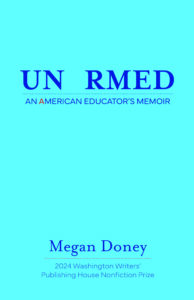-
Megan Doney
Megan earned an MFA in creative writing from Lesley University, and is a professor of English at New River Community College, where she teaches creative writing, composition, and literature. She was a 2007 Fulbright-Hays fellow to South Africa, and returned to that country in 2015-2016 as a research fellow at the University of the Free […]continue reading…
What was the most challenging moment in your process of writing this memoir?
I can’t pinpoint a specific moment in the writing process itself; all of the writing was intellectually and emotionally challenging. However, I was very low after two failed connections with agents, being out on submission for more than a year, and multiple editors who basically said they thought the book was beautiful and important, but unsellable. In October 2023, I started sending the manuscript to small presses and contests and set December 31 as my final deadline; I would not submit it any further after that and I was prepared to junk it. Then, Caroline Bock from WWPH called me in January with the incredible news.
What do you hope educators like yourself will take away from this work?
I would like them to remember what brings them joy and meaning in their vocation. I believe teaching is sacred work and that learning alongside our students is a tremendous privilege. That said, I also hope that they will honor their boundaries and the limits of what they can and will do within that vocation. So much is asked of educators. It is too much to ask that they also assume mortal danger in their work.
What is your writing process/daily writing practice?
It depends on where I am in a text. I tend to think very metaphorically and associatively, and it takes me a long time to read, journal, annotate, and assemble my thoughts into something that (I think) might make sense. When actively drafting, I often use the Pomodoro method to stay focused. I’ve kept a journal my entire life, so I rely on that to work out my thoughts and have a tangible record of what I was thinking and doing at a particular moment.
What book/s are on your nightstand?
Autobiography of a Yogi by Paramahansa Yogananda; The Children’s Book by A.S. Byatt; Yellowface by R.F. Kuang; Once In The West by Christian Wiman; The Cross and the Lynching Tree by James Cone.
What advice would you give to anyone writing a memoir on a difficult subject?
Do not mistake writing for therapy. See T. Kira Madden’s article on this subject. The process of creation, and turning your experience into a narrative for an audience, demands that you, the writer, become your audience and balance distance with intimacy. Madden describes it as a kind of translation. The situation, as Vivian Gornick put it, is not the story.
-
Featured WWPH Publication Unarmed: An American Educator’s Memoir
A memoir of a teacher's perspective on the current experience of American students, written as a personal response to a school shooting at New River Community College in Christiansburg, Virginia. A must-read for educators at all levels, for college students, for parents, and for all of us who think deeply and widely about American society.continue reading…
;)